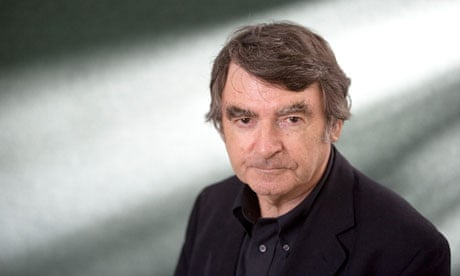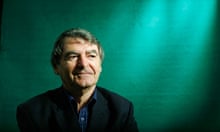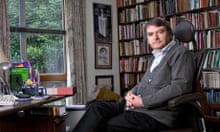There we were, doing something like literary criticism on a novel dedicated to satirising the industry of academic literary criticism. When David Lodge came to the Guardian book club to discuss Small World, the very first questioner wondered whether the critical discourses that found their way into the novel, all deriving in some way from real critical movements, had any staying power, or were they so much "twaddle". Lodge, who was once one of the foremost explicators of Mikhail Bakhtin in the anglophone world, deftly avoided specifying what critical beliefs continued to influence him, though his several references to the "carnivalesque" aspects of his fiction gave a clue to his tastes. As in the works that Bakhtin favoured, the academic comic novel shows the lower motives of high-minded people.
The novel clearly still comes to ebullient life for its readers, yet it depicts a lost world. Professor Morris Zapp's peroration about the world-transforming effects of the Xerox machine and direct-dialled phone calls now sounds, the author wryly conceded, deliciously antique. There was some rumination about the changing aspects of academic life ("Not as much fun"), with one reader asking: "Would it be possible to write such a successful and high-impact satirical novel around academic life today?" The new culture of measurement and assessment was, the questioner suggested, so absurd that it was ripe for satire, but so grey that it hardly tempted the comic writer. "Do you think that the behaviour of academics at conferences has changed as a result of Small World?" asked another reader, mischievously. Lodge remembered some colleagues at Birmingham University complaining that, because of the novel, their wives looked at them suspiciously after they came back from conferences. He sounded rather regretful as he said that the culture of "hedonism" that was once in evidence has indeed perished, and earnest sobriety taken over.
Satirising your own world has its difficulties. "As a novelist, I was undermining, or subverting, or satirising the institution in which I was working, and I began to find that more and more difficult." What about the "gender politics" of academia, a member of the audience asked. "In Small World most of the academics are male and that is realistic. The female academics, I would suggest, are treated rather harshly by the satire. In your later work you seem to be more sympathetic to the role of the female academic." Our author would not concede that this was a fair picture. The novel's two main female characters, Angelica Pabst and Miss Sybil Maiden, were the only two characters in the novel who seemed to know what was really happening. Lodge confessed that he had re-read the paper that Angelica gives at the MLA conference and thought it was "really rather good". "She runs rings round the male characters."
Angelica is also a character from a romance plot taken from Ariosto's Orlando Furioso, and relish for the allusiveness of Small World was shared. One commenter on the book club website claimed that their interest in grail stories had been so awakened by the novel that they had named their son Perceval. There were comparisons with the literariness of other academic novels, notably AS Byatt's Possession, and another commenter pointed out that Anthony Powell's final novel, The Fisher King, had used the same myth as Lodge. "I wonder if Powell ever acknowledged any indebtedness to Lodge for suggesting the same legend to him as a structure for his novel?"
The author's delight in the carnivalesque allowed him to exploit mythology, but what about other belief systems? One reader wanted to know if Lodge would call himself a Catholic novelist. He declined the label, preferring to see Catholicism as one comic element among others, though he agreed that the Catholicism of his protagonist, Persse, was central to the plot of Small World. (Like some knight from romance, he intends to win his beloved while preserving his chastity.) If we were to read his novels in chronological order we would see, he thought, a once orthodox Roman Catholic becoming "less and less so as time went on".
We had talked a good deal about how much Lodge had drawn on the real American academic Stanley Fish for his roguish Professor Morris Zapp, and there was a good deal of affection on show for a character who has taken on a peculiar life of his own. The pleasure of creating Zapp for Lodge was bringing him to England – seeing his own country through the eyes of another. "Is there any way we can tempt you to bring Morris back," pleaded one reader, "perhaps in a nursing home novel?" The old monster would now be in his 80s, but that perhaps was not the main problem. "The way that Stanley Fish has co-opted the character makes it difficult for me to write about him any more." Indeed, we managed to get confused between the two of them. "He writes a column for the New York Times … He teaches at Yale." We all thought for a moment it was Zapp that he was describing, but in fact it was the equally unstoppable Fish. Could Zapp not live on, like his real-life counterpart? Perhaps a short story? "OK," said his creator, "I'll think about that one."




Comments (…)
Sign in or create your Guardian account to join the discussion